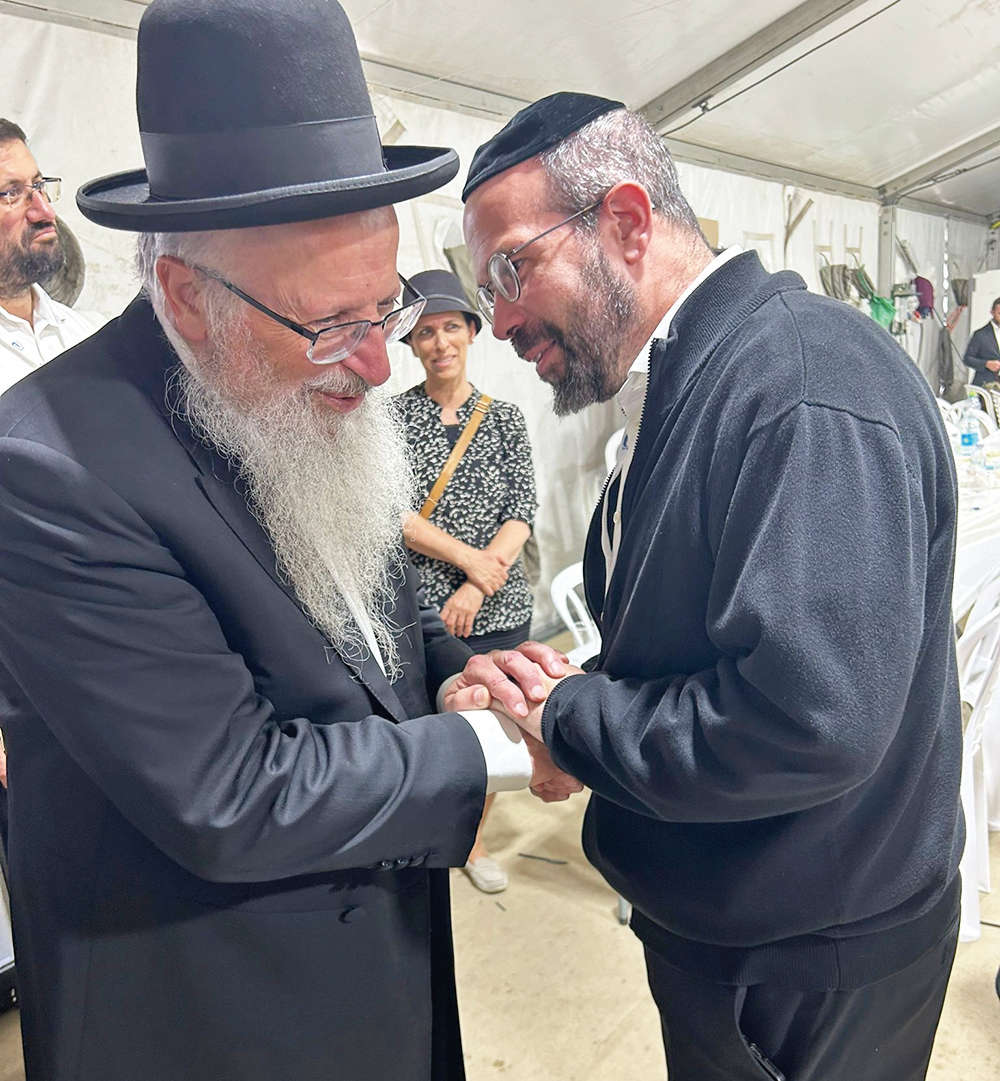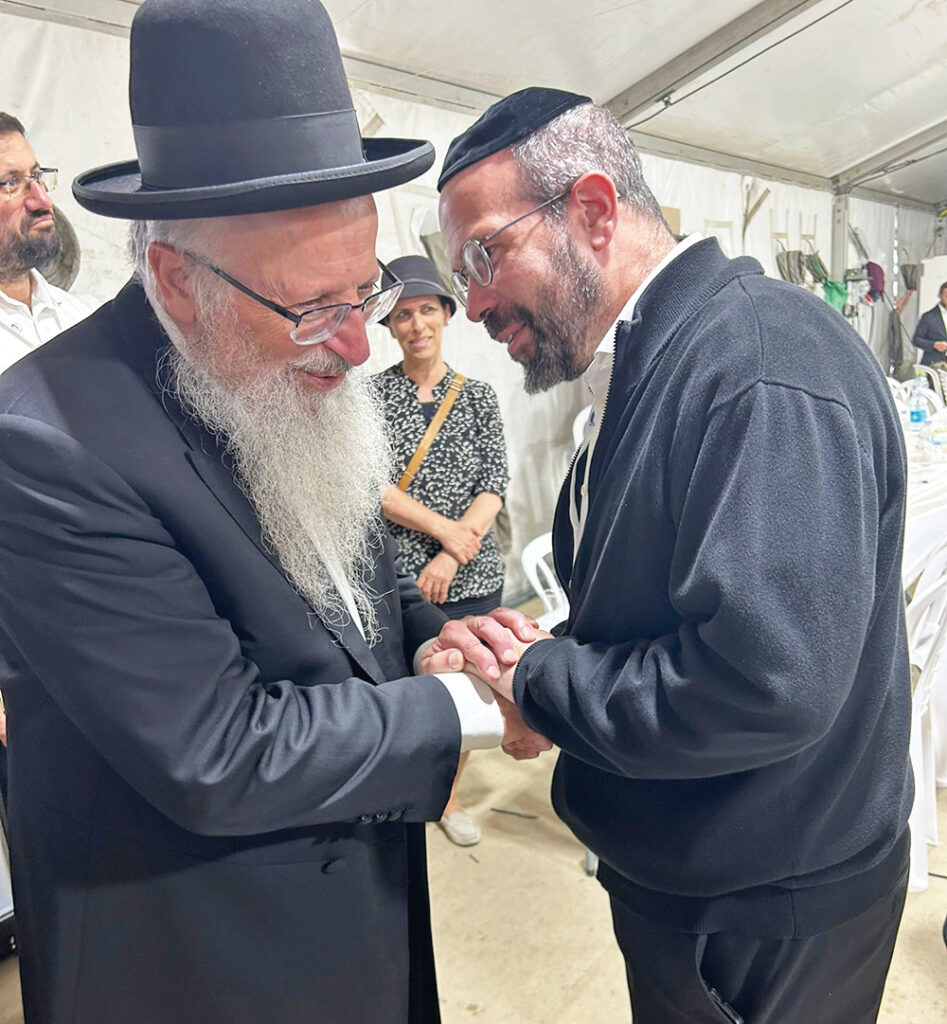
Editor’s note: Rabbi Rothwachs left for Israel on Monday evening, and is sharing his perspective with those at home via WhatsApp. We are providing a smattering of his thoughts and pictures over his first few days.
For some reason, this looked suspicious to the customs agents, and I was (gently) interrogated to make sure that I was not bringing anything into the country for the purpose of being sold or traded. I responded that these bags are filled with the donations of עם ישראל and so they could not be sold, as they are truly, and quite literally, priceless.
The Power of Presence
War. For over three weeks, we have been hyper-focused on the war that is unfolding in Israel.
With the never-ending news cycle, our attention has shifted from one chapter in this story to the next. Attempting to process the unfolding horrors of Hamas’ barbaric attack on our homeland, then trying to somehow come to terms with unfathomable numbers of casualties, hostages, injuries, and the countless displaced families. Our focus then shifted again, this time to the battlefronts, both in the north and the south, watching the surgical attacks from the air, and bracing ourselves for the next stages of the battle—on the ground. We have watched cycles of rage and violence unfold in the U.S. and around the entire world, wondering when we will awake from this nightmare, asking ourselves if this can truly be happening.
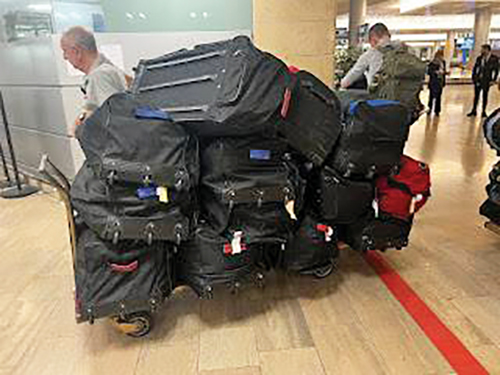
31 overstuffed duffle bags.
But tonight, together with other representatives of the American rabbinate, I had the privilege to hear from ordinary people who remain singularly focused on the events of this past Simchat Torah. The Ramada Hotel in Jerusalem, one of many hotels providing hospitality to evacuees from both the north and south, is currently providing shelter, food, warmth, programming and relative calm to over 1,600 people who watched the horrors of that fateful day unfold in real time. They shared their stories with a mixture of intense trauma and profound composure. Men and women, of different ages and backgrounds, sharing the horrifying events of three weeks ago. I, together with my friends and colleagues, did the only thing we could do—sit and listen. I could not help but feel exceptionally inadequate to be sitting in that space, profoundly aware of how little I could possibly understand and appreciate the trauma they had experienced.
Yet, something remarkable happened. Something which I have seen so many times before yet caught me by surprise tonight—they were all so grateful for our presence and concern. They felt so lifted and comforted knowing that there were others who cared for them, their families and their communities.
The simple act of lending a listening ear, providing a space for them to share their experiences and their pain, served as a vivid reminder that sometimes, all it takes to make a significant impact in someone’s life is to be present, to show up and to listen. In the midst of the chaos and the devastation, the simple act of being there communicated more than words ever could. It was a moment of genuine connection.
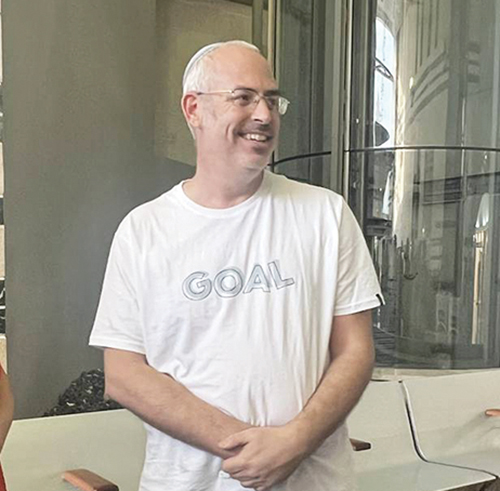
As I listened to their stories, I realized that this act of listening was not just beneficial for them; it was transformative for me as well. It was a stark reminder that in our quest to provide solutions and fix problems, we often underestimate the power of presence. We forget that sometimes, all a person needs is to feel heard, to feel seen, and to know that they are not alone.
As we navigate the complexities of life and encounter people who are experiencing challenging times, let us never underestimate the impact we can make by simply offering a listening ear. Let us remember that our presence, our ability to listen, and our willingness to simply be there can be a source of hope and strength to those in need.
Grab and Go
If you had to immediately evacuate your home with no way of knowing when you would be able to return, what would you grab with you on the way out? For most of us, this is nothing more than a purely hypothetical exercise in thought. Yet, for the evacuees who shared their stories with us, this was their reality, as they swiftly fled from their homes and communities. While they are all grateful to be alive and sheltered in a place of safety, the split-second decision of what to take and what to leave behind continues to reverberate even weeks later. Having never been faced with this particular dilemma, I am far from confident that I can answer this question with truthfulness and accuracy. However, hearing these firsthand accounts motivates me to, at the very least, take a moment and try.
Undoubtedly, it is an unsettling thought, imagining oneself in such dire circumstances. Yet, I believe it’s an important exercise, forcing ourselves to consider what truly holds value in our lives. It brings to light the importance of cherishing our possessions, not for their material worth, but for the true meaning they carry. So, as I sit here, pondering over what I would grab and go, I realize it’s not just about the items themselves, but about holding onto the fragments of life that define us, even when the rest of the world seems to be falling apart.
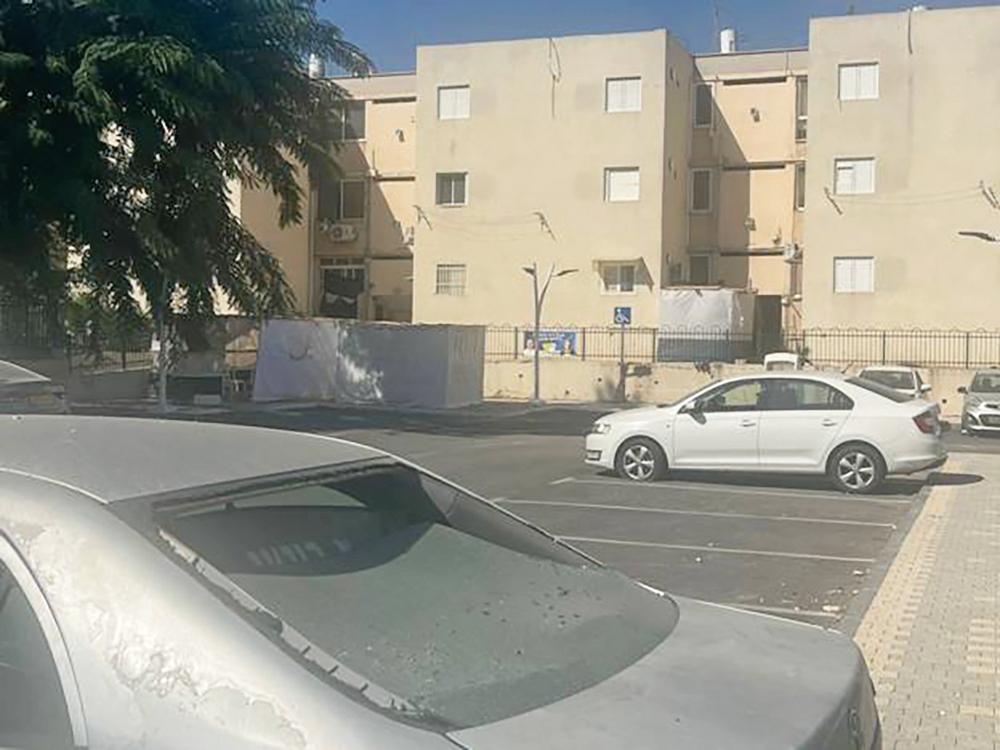
Heroes in Action, Giants in Character
Today, we had the privilege of meeting some truly extraordinary individuals, and among them was Yossi Urim, a man with a remarkable story of survival and kindness. On the morning of Simchat Torah, Yossi, who lives in Sderot, was shot by a terrorist right outside his shul.
Despite the severity of his injuries, today marked a significant milestone in his recovery as he was finally being discharged from the hospital, over three weeks later. He recounted his incredible tale of survival with us, attributing his life to the timely intervention of two strangers from another community who courageously came to his rescue.
Yossi described that on that fateful day, amidst the catastrophic chaos, the local ambulance and emergency responders were overwhelmed and couldn’t reach him in time. Steadily losing blood at home, he started to wonder how he could possibly survive this ordeal. That’s when two men showed up at his house. Realizing the gravity of the situation, they made a swift decision to drive him to Soroka Hospital themselves.
In an innovative and quick-thinking move, they dismantled one of the closet doors to create an improvised stretcher. They then carefully placed Yossi in the back of their car, doing their best to stabilize him for the journey ahead. As Yossi grappled with his injuries, finding it increasingly difficult to breathe, the men offered words of reassurance, urging him to hold on and promising that help was on the way.
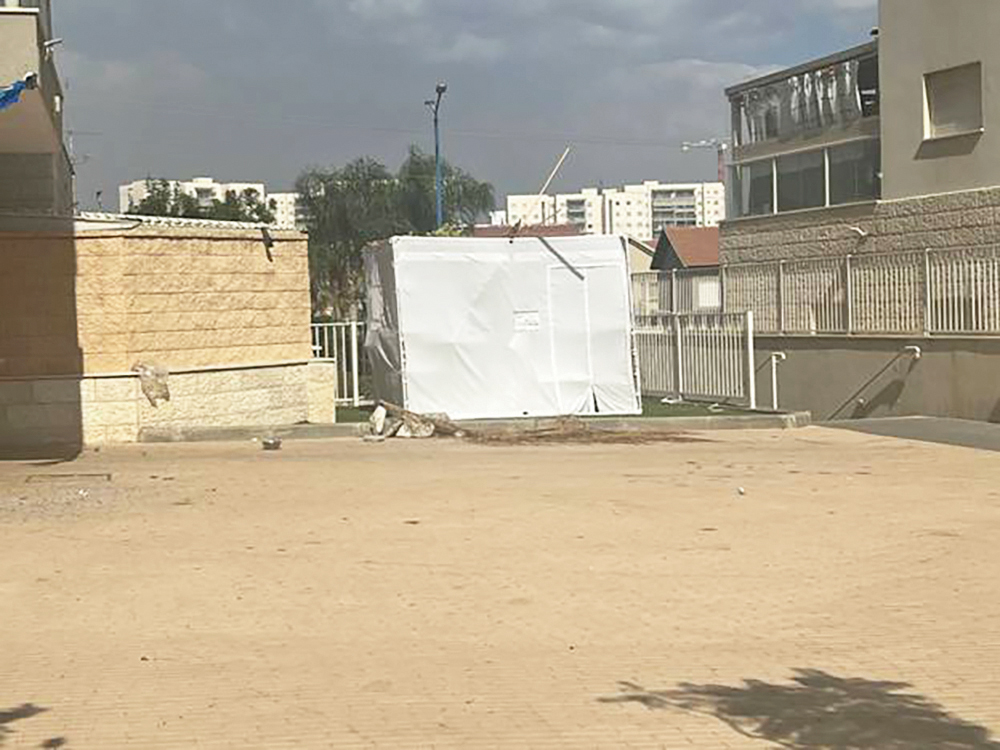
It was at Soroka Hospital where our paths crossed with Yossi, allowing us to bear witness to his story of resilience and the unwavering spirit of human kindness.
One of the men who had come to Yossi’s aid, Leon, embodied the true essence of a hero. Tragically, his life was cut short the very next day, as he too fell victim to a murderous terrorist. Although Yossi was still confined to his hospital bed and unable to visit Leon’s family during their shiva, his parents went to pay their respects on his behalf.
During their visit, Leon’s wife shared an incredible story about her late husband. She revealed that on the night before his death, Leon had spoken to her about the heroic deed he had performed that morning, saving a life by rushing Yossi to the hospital. With a deep sense of responsibility still lingering, Leon asked his wife to please remind him to return to Yossi’s house when this nightmare was all over. When she asked him why, he unassumingly responded, “I need to fix the closet door.”
יהי זכרו ברוך
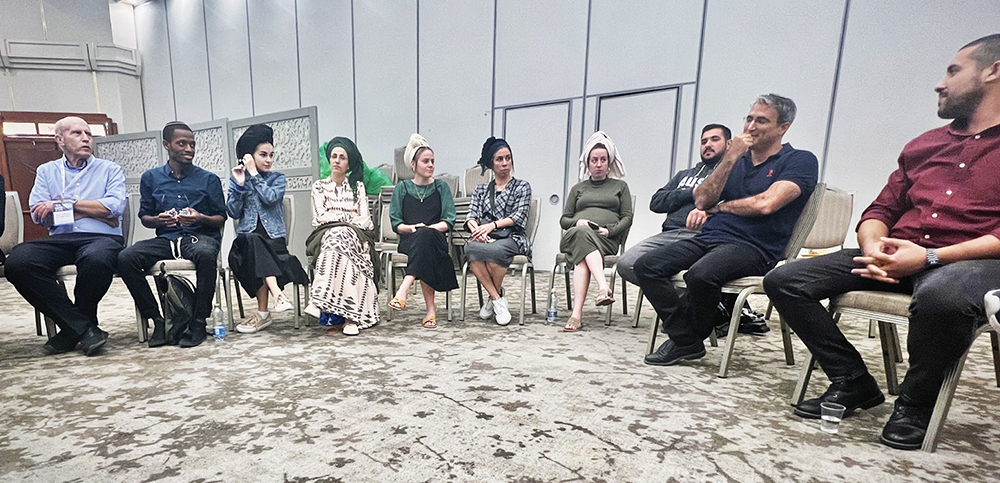
Look Who’s Standing
Walking through the nearly deserted streets of Sderot today, I found myself surrounded by a haunting yet powerful sight: sukkot … everywhere. Still standing long after the holiday of Sukkot has come to an end, these sukkot, typically dismantled after Simchat Torah, have become frozen in time, serving as a time stamp of the catastrophic attack that took place a little over three weeks ago.
As we know, sukkot are meant to be temporary shelters, reminding us of the protection provided to our people for 40 years in the desert. Sukkot is a time of immense joy, a period for reflection on the hashgacha pratis (divine protection) that has shielded us since the start of our nationhood. Yet, in Sderot, the joyous celebrations of this holiday were cut tragically short and the sukkot remain, standing in silence, bearing witness to the turmoil that ensued.
Yet, I believe that the lingering presence of these sukkot, now empty and almost ghost-like, tells a story of resilience and strength. They stand defiantly, bearing the weight of recent history, serving as a metaphor for the enduring spirit of the people. Despite their fragility and temporary nature, these sukkot have withstood the test of time, much like the community they represent.
The way I see it, the sight of these structures, still standing in the face of adversity, powerfully reinforces the concept of hashgacha pratis. The sukkah represents Hashem’s sheltering presence, “a sukkah of peace enveloping and protecting His people.” The sukkot of Sderot, remaining upright and steadfast, stand as a powerful reminder of this divine protection,
highlighting the unwavering strength and resilience that faith and community can provide. These sukkot stubbornly serve as a testament to the strength of the human spirit and the power of community.
As I returned to the hotel late this evening, I encountered many evacuees from Sderot, who have taken temporary shelter far from where their sukkot still stand. Yet the people of Sderot, much like their sukkot, remain resilient, their spirit not dampened by adversity. Sderot, with its standing sukkot, becomes a symbol not of defeat, but of indomitable strength and unwavering hope, proving once again that out of darkness can come the most profound light.


